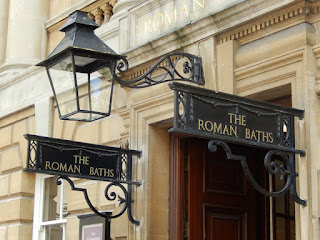Learning expeditions are like thematic units on steroids (you can learn more about learning expeditions at GCCS here) and this year we are tackling a pretty intense project (nothing short of a complete energy, water and waste audit of the school!). Weaving in the narrative from my Fund For Teachers fellowship was supposed to be a non-negotiable, but I should have known better. Everything can - and often should - be negotiated. Instead of our focus being on the literal and metaphorical walls people build, we will instead look at how the ancient world grappled with heat, water and waste management in their cities and what lessons we can learn from them, 2,000 years later. What better lens to use than the Roman Bath, where all three systems converged.
 |
| "To see the world in a grain of sand” - or an expedition through a bath! |
Another aspect that emerged from my fellowship was the role of writing in the Roman world. I knew the Romans were a literate people, but the extent to which they used writing on a daily basis took me by surprise. From the wooden Vindolanda tablets unearthed near Hadrian’s Wall to the curse tablets discovered at Aquae Sulis (Bath, England), Roman writing captured the essence of everyday life. I am hopeful that I can weave this element of the Roman world into my student’s own literacy. My Fund For Teachers experience also inspired my own professional goal setting around becoming a more competent teacher of writing and learning how to provide enough scaffolding and feedback to give sixth-graders the confidence, stamina, and independence to take on this expedition’s final product - a blog that chronicles their progress in making GCCS become a more sustainable school.
 |
| I learned much from the “everyday” writing of the Romans. What will the world learn from the everyday writing of my students? |
I will be tag-teaming blogs for the next few months, guiding sixth-graders through the creation of their own blog (our hope is for it to go live in about two months) while continuing to reflect and share through mine. I was a little sad to have to triage so much of what I learned over the summer to make this current expedition fit, but I know that I have thousands of “grains of sand” to transform into meaningful learning expeditions in years ahead. If not for my visit to Hadrian’s Wall, I would know nothing of the Vindolanda tablets, Roman cursive, or the breadth of literacy across the Roman Empire. Hadrian’s Wall now lies in ruins, the mighty empire now a history lesson, but their written words live on, inspiring a sixth-grade class in the 21st century to document their own progress and legacy to the world. We’re looking forward to sharing it with you soon!
No comments:
Post a Comment